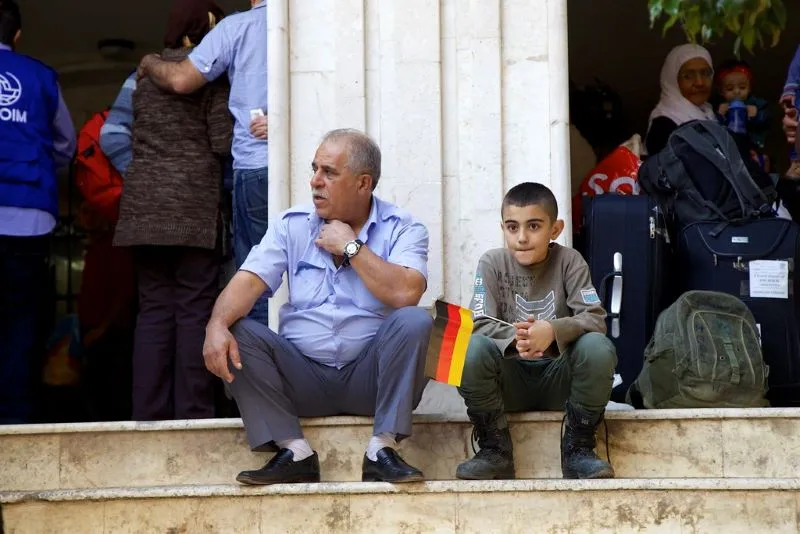
Tareq Alaows, a Syrian who studied law and international affairs in Damascus, ended up as a refugee in Germany. Along with hundreds of thousands of others, Alaows protested against the Syrian government and called for an end to political repression, better education, and economic opportunities. But along with 5.5 million compatriots, he had to flee his home country.
Like the million-plus Syrian refugees in Europe, Alaows had hoped for a life free of intimidation in democratic nations that promised human rights. But he experienced that refugees were widely discriminated against and seen simply as conservative Muslims, worse extremists, and not as professionals with a wealth of knowledge. A life of dignity was not guaranteed for refugees like him even in Germany. But in a European country, he could at least fight for it without death threats, so he joined politics.
Alaows became a member of the Green Party in Germany and decided to field himself as a candidate in the upcoming elections. He applied to be naturalised as a German citizen to be able to contest the polls and represent refugees in the Bundestag, Germany’s parliament. He received promising press and gave hope to Syrians in Europe that they may finally have a voice in nations they now lived in and wanted to embrace more holistically.
The liberals in Germany were shocked and saw it as a sign of the fragility of their democracy.
But threats chased him even in Germany, finally forcing him to drop out of the elections as a candidate. It is not clear who threatened him but it seems the threats came from right-wing Germans, most of whom have opposed the presence of Syrians in Germany. In a statement, Alaows said that his candidacy has shown that in all parties, in politics, and society as a whole, strong structures are needed to face up to structural racism and help those affected.
“The
great public interest generated by my candidacy shows what we refugees can do. But unfortunately, our society lacks discrimination-free spaces in many areas of life. It’s up to all of us to actively deal with that in our surroundings and to change things.”
The liberals in Germany were shocked and saw it as a sign of the fragility of their democracy. Germany’s Foreign Minister Heiko Maas said such threats were dismal for German democracy. But Tareq’s withdrawal from the elections revealed how difficult the admirable goal of full-integration of Syrians in European countries is. Germany is perhaps one of the best performing states when it comes to their integration.
According to Deutsches Institut für Wirtschaftsforschung (DIW), a German think tank, at least half of the refugees who wanted a job in 2016 had one by 2018. Most refugees in Germany are Syrians.
The courts in many countries, including in Germany, are overruling deportations because of the risk accompanied with returns.
But even though Syrian refugees have been integrated relatively faster in Germany, social integration continues to be a challenge in the labour market.
Many Syrians who are now employed in European countries hope to obtain citizenship in their host countries. Many have learned local languages, acquired vocational skills — even though they had professional degrees from Syria, and are paying taxes instead of living on state dole. They see themselves as productive members of societies they live in and hope to be recognised for what they do.
In 2019, less than 4,000 Syrians were granted citizenship in Germany, many of whom are believed to be refugees. Activists believe the numbers of applicants will rise this year and the next as most Syrian refugees complete their eight years that are required before the application is considered. Activists say citizenship is the only way forward for Syrians in Europe to fully assimilate and get full rights.
The far-right in Europe may continue to use the Syrians for political purposes but no one believes the Syrians would be able to leave.
Tariq’s experience, however, has dampened their spirits. The right-wing parties in Germany and elsewhere in Europe say that since an armed conflict in Syria has subsided, the Syrians must return home. But the courts in many of these countries, including in Germany, are overruling deportations because of the risk accompanied with returns. That said, the government in Denmark has decided to deport more than 90 Syrians, and Germany has lifted the ban on deportations of Syrians with a criminal background.
The far-right in Europe may continue to use the Syrians for political purposes but no one believes the Syrians would be able to leave. Germany, and other European nations hosting them now have a choice: Keep the Syrians in limbo and force them to face uncertainty in perpetuity or embrace them as their own by granting citizenship to as many as possible.
The views expressed above belong to the author(s). ORF research and analyses now available on Telegram! Click here to access our curated content — blogs, longforms and interviews.



 Tareq Alaows, a Syrian who studied law and international affairs in Damascus, ended up as a refugee in Germany. Along with hundreds of thousands of others, Alaows protested against the Syrian government and called for an end to political repression, better education, and economic opportunities. But along with 5.5 million compatriots, he had to flee his home country.
Like the million-plus Syrian refugees in Europe, Alaows had hoped for a life free of intimidation in democratic nations that promised human rights. But he experienced that refugees were widely discriminated against and seen simply as conservative Muslims, worse extremists, and not as professionals with a wealth of knowledge. A life of dignity was not guaranteed for refugees like him even in Germany. But in a European country, he could at least fight for it without death threats, so he joined politics.
Alaows became a member of the Green Party in Germany and decided to field himself as a candidate in the upcoming elections. He applied to be naturalised as a German citizen to be able to contest the polls and represent refugees in the Bundestag, Germany’s parliament. He received promising press and gave hope to Syrians in Europe that they may finally have a voice in nations they now lived in and wanted to embrace more holistically.
Tareq Alaows, a Syrian who studied law and international affairs in Damascus, ended up as a refugee in Germany. Along with hundreds of thousands of others, Alaows protested against the Syrian government and called for an end to political repression, better education, and economic opportunities. But along with 5.5 million compatriots, he had to flee his home country.
Like the million-plus Syrian refugees in Europe, Alaows had hoped for a life free of intimidation in democratic nations that promised human rights. But he experienced that refugees were widely discriminated against and seen simply as conservative Muslims, worse extremists, and not as professionals with a wealth of knowledge. A life of dignity was not guaranteed for refugees like him even in Germany. But in a European country, he could at least fight for it without death threats, so he joined politics.
Alaows became a member of the Green Party in Germany and decided to field himself as a candidate in the upcoming elections. He applied to be naturalised as a German citizen to be able to contest the polls and represent refugees in the Bundestag, Germany’s parliament. He received promising press and gave hope to Syrians in Europe that they may finally have a voice in nations they now lived in and wanted to embrace more holistically.
 PREV
PREV


